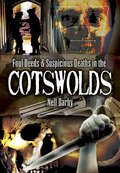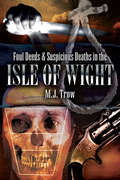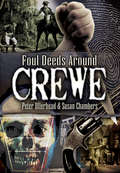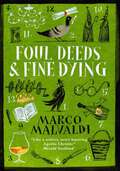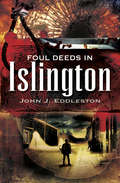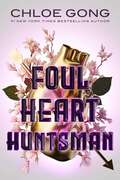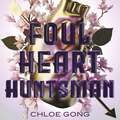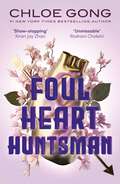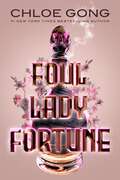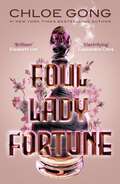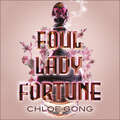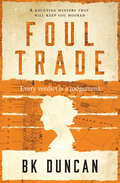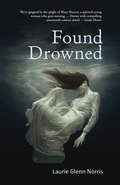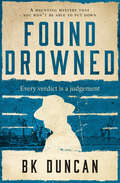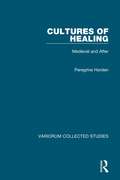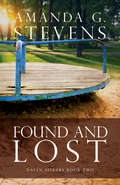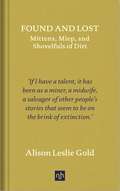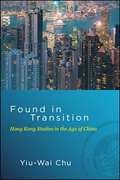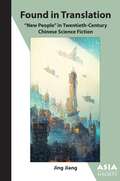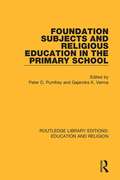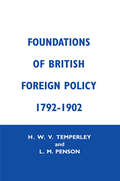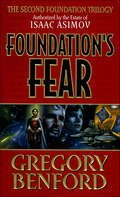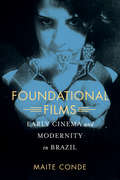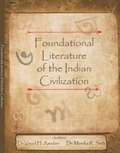- Table View
- List View
Foul Deeds & Suspicious Deaths in the Cotswolds (Foul Deeds & Suspicious Deaths)
by Nell DarbyFoul Deeds and Suspicious Deaths in the Cotswolds explores the dark history of this famously picturesque region of England. Behind the picture-postcard idyll, everyday life in this largely rural area saw murders, beatings, jealousy and alcohol-fuelled crimes. Nell Darby's book examines a selection of these shocking events in vivid detail. Drawing on contemporary sources, newspapers and prison records, she gives a fascinating insight into life and death in the surprisingly turbulent past of the Cotswolds. The cases she reconstructs come from all over the region—the towns, the villages, the countryside. They show how Cotswold people carried out violent crimes regardless of their location and upbringing—from unemployed farmers' sons to educated surgeons, dark deeds were committed by individuals from all walks of life. They also reveal the criminal consequences of greed, madness, malice, carelessness and drink. Women were involved almost as often as men, as victims and as perpetrators.Nell Darby's thoroughly researched and sympathetically written anthology of Cotswold cases be compelling reading for anyone who lives in the area or is interested in its history.
Foul Deeds & Suspicious Deaths in the Isle of Wight (Foul Deeds & Suspicious Deaths)
by M. J. TrowDiscover the darker side of this scenic destination with over twenty true-crime tales, accompanied by photos and illustrations. Its natural beauty attracts countless visitors—but notorious cases of murder, deceit, and pure malice have marked the long history of this apparently peaceful island. From crimes of passion to opportunistic killings and coldly premeditated acts of murder, the full spectrum of criminality is recounted here. For this journey into a bloody, neglected aspect of the past, Isle of Wight historian and crime writer M.J. Trow has selected over twenty notorious episodes that give a fascinating insight into criminal acts and the criminal mind. He throws light into the shadowy world of the smugglers, pirates, and robbers who plagued the island&’s early history. He recalls the escape attempts of Charles I from Carisbrooke Castle, the mysterious loss of the Mary Rose and HMS Royal George, and the scandalous conduct of Lady Worsley. In vivid, sometimes shocking detail, he reconstructs notable criminal cases, including the brutal murders that have marked the island&’s more recent past. In addition, he delves into the history of the island&’s three prisons—Albany, Parkhurst, and Camp Hill—which have housed many of Britain&’s most violent criminals.
Foul Deeds Around Crewe (Foul Deeds & Suspicious Deaths)
by Susan Chambers Peter OllerheadTrue accounts of crime and conspiracy over the centuries in this English railway town, from highway robberies to modern-day homicides—includes photos. Foul Deeds Around Crewe takes the reader on a fascinating journey through centuries of local crime and conspiracy, meeting villains of all sorts along the way—casual killers and robbers, murderous husbands and lovers, prostitutes and poisoners. This revealing book recalls many grisly events and sad or unsavory individuals whose conduct throws a harsh light on the history of Crewe and the surrounding countryside. Among the many acts of wickedness the authors recall are shocking crimes from the recent past—the daughter who poisoned her father, a murder in a stately home, two brothers who conspired to kill their father, a mysterious ritual drowning, and the killing of a policeman. But they also cover in vivid detail the early criminal history of the area—the theft of sheep, cattle, and horses, crop-wrecking, rural assaults, land disputes, poaching, and highway robbery. The ruthless punishments meted out to convicted criminals—public humiliation, imprisonment, the death penalty—are an essential part of the story. This chronicle of Crewe&’s hidden history—the history the town would prefer to forget—will be compelling reading for anyone who is interested in the dark side of human nature.
Foul Deeds and Fine Dying: A Pellegrino Artusi Mystery
by Marco MalvaldiPellegrino Artusi, the great gastronome and amateur detective, is back. It is 1900 and Pellegrino's famed cookbook is in its fifth edition. Flushed from his fortune and success, our hero joins a weekend party at the Tuscan castle of the wealthy agricultural entrepreneur, Secondo Gazzolo. In this castle of winding corridors, secret passageways and clandestine meetings, Pellegrino finds a curious collection of guests, each with their own purpose for being there.But when one of the party is found dead in his locked bedroom, seemingly the victim of suffocation, it is up to Pellegrino and his old friend, the detective Ispettore Artistico, to solve what really happened, for the science of food is every bit as complex, rigorous and tantalising as the sublime art of investigation.A perfect "locked room mystery" that will have your brain and your tastebuds tickled.Translated from the Italian by Howard Curtis
Foul Deeds and Fine Dying: A Pellegrino Artusi Mystery
by Marco MalvaldiPellegrino Artusi, the great gastronome and amateur detective, is back. It is 1900 and Pellegrino's famed cookbook is in its fifth edition. Flushed from his fortune and success, our hero joins a weekend party at the Tuscan castle of the wealthy agricultural entrepreneur, Secondo Gazzolo. In this castle of winding corridors, secret passageways and clandestine meetings, Pellegrino finds a curious collection of guests, each with their own purpose for being there.But when one of the party is found dead in his locked bedroom, seemingly the victim of suffocation, it is up to Pellegrino and his old friend, the detective Ispettore Artistico, to solve what really happened, for the science of food is every bit as complex, rigorous and tantalising as the sublime art of investigation.A perfect "locked room mystery" that will have your brain and your tastebuds tickled.Translated from the Italian by Howard Curtis
Foul Deeds in Islington (Foul Deeds & Suspicious Deaths)
by John J. EddlestonFoul Deeds in Islington takes the reader on a sinister journey through a selection of the most shocking and revealing murders committed in this part of north London during the last two centuries. Killers of all kinds are recorded here, from the coolest and most calculating of criminals to ill-starred individuals who struck out in passion or despair or anger. John Eddleston recounts their notorious stories in forensic detail. Police-killers Thomas Cooper and Ronald Marwood feature in his book, along with the child-killer Celestika Somner, the poisoner George Chapman, the witchcraft-murderer Kayode Orishagbemi and, of course, most famous of all, Kenneth Halliwell who killed playwright Joe Orton in their flat in Noel Road. In addition to these celebrated cases, several less well-known but equally compelling murders are reconstructed. They give a shocking insight into the dark side of Islington s recent, sometimes gruesome, history.
Foul Heart Huntsman (Foul Lady Fortune #2)
by Chloe GongFrom the #1 New York Times bestselling author of These Violent Delights and Our Violent Ends comes the &“fast-paced…impressive&” (Kirkus Reviews) second book in the captivating Foul Lady Fortune duology following an immortal assassin in 1930s Shanghai as she races to save her country and her love.Winter is drawing thick in 1932 Shanghai, as is the ever-nearing threat of a Japanese invasion. Rosalind Lang has suffered the worst possible fate for a national spy: she&’s been exposed. With the media storm camped outside her apartment for the infamous Lady Fortune, she&’s barely left her bedroom in weeks, plotting her next course of action after Orion was taken and his memories of Rosalind wiped. Though their marriage might have been a sham, his absence hurts her more than any physical wound. She won&’t rest until she gets him back. But with her identity in the open, the task is near impossible. The only way to leave the city and rescue Orion is under the guise of a national tour. It&’s easy to convince her superiors that the countryside needs unity more than ever, and who better than an immortal girl to stir pride and strength into the people? When the tour goes wrong, however, everything Rosalind once knew is thrown up in the air. Taking refuge outside Shanghai, old ghosts come into the open and adversaries turn to allies. To save Orion, they must find a cure to his mother&’s traitorous invention and take this dangerous chemical weapon away from impending foreign invasion—but the clock is ticking, and if Rosalind fails, it&’s not only Orion she loses, but her nation itself.
Foul Heart Huntsman: The stunning sequel to Foul Lady Fortune, by a #1 New York times bestselling author (Foul Lady Fortune)
by Chloe GongThe captivating sequel to Foul Lady Fortune, by the New York Times bestselling author of These Violent Delights.Winter is drawing thick in 1932 Shanghai, as is the ever-nearing threat of invasion.Rosalind Lang has encountered the worst possible fate for a national spy: she's been exposed. With the media storm camped outside her apartment for the infamous Lady Fortune, she's barely left her bedroom in weeks, plotting her next course of action after Orion was taken and his memories of Rosalind wiped. Though their marriage might have been a sham, his absence hurts her more than any physical wound. She won't rest until she gets him back. I can help you get him back. Find me in Zhouzhuang. -JM.But with her identity in the open, the task is near impossible. The only way to leave the city and rescue her beloved is the guise of a national tour: convincing her superiors that the countryside needs unity more than ever, and who better than an immortal girl to stir pride and strength into the people? When the tour goes wrong, however, everything Rosalind once knew is thrown up in the air. Taking refuge outside Shanghai, old ghosts come into the open and adversaries turn to allies. To save Orion, they must find a cure to his mother's traitorous invention and take this chemical weapon away from impending foreign invasion - but the clock is ticking, and if Rosalind fails, it's not only Orion she loses, but her nation itself.(P)2023 Simon & Schuster Audio
Foul Heart Huntsman: The stunning sequel to Foul Lady Fortune, by a #1 New York times bestselling author (Foul Lady Fortune)
by Chloe GongA lover in peril. A nation under threat. The clock is ticking . . .'AMAZING, SHOW-STOPPING, SPECTACULAR' XIRAN JAY ZHAOThe captivating sequel to Foul Lady Fortune, by the New York Times bestselling author of These Violent Delights.Winter is drawing thick in 1932 Shanghai, as is the threat of a Japanese invasion. Rosalind Lang's identity as a national spy has been exposed. With the media camped outside her apartment, she's barely left her bedroom in weeks, plotting her next course of action after Orion was taken and his memories wiped. Their marriage might have been a sham, but his absence hurts more than any physical wound. She won't rest until she gets him back. But with her identity in the open, the task is near impossible. The only way to rescue Orion is under the guise of a national tour. It's easy to convince her superiors that the countryside needs unity more than ever, and who better than an immortal girl to stir pride and strength? When the tour goes wrong, everything Rosalind once knew is thrown up in the air. Taking refuge outside Shanghai, old ghosts return and adversaries turn to allies. To save Orion, they must find a cure to his mother's invention and steal this dangerous weapon away from foreign invasion -but the clock is ticking, and if Rosalind fails, it's not only Orion she loses, but her nation itself . . .PRAISE FOR CHLOE GONG'A glamorous spy thriller that will leave you breathless' DUSTIN THAO'Brilliant pacing and utterly dynamic characters' ELIZABETH LIM'The chemistry was crackling, the revelations hair-raising, and I was so taken by the world that I did not see the reveals coming' JOAN HE'A thrilling historical fantasy packed with action, intrigue, and swoon-worthy romance' JUNE HUR'A dark delight . . . Captivating' RENEE AHDIEH'Equal parts intoxicating and dazzling, Gong's newest duology is enchanting and unmissable' ROSHANI CHOKSHI
Foul Lady Fortune (Foul Lady Fortune #1)
by Chloe GongFrom the #1 New York Times bestselling author of These Violent Delights and Our Violent Ends comes the &“equal parts intoxicating and dazzling&” (Roshani Chokshi, New York Times bestselling author of The Gilded Wolves) first book in a captivating new duology following an ill-matched pair of spies posing as a married couple to investigate a series of brutal murders in 1930s Shanghai.It&’s 1931 in Shanghai, and the stage is set for a new decade of intrigue. Four years ago, Rosalind Lang was brought back from the brink of death, but the strange experiment that saved her also stopped her from sleeping and aging—and allows her to heal from any wound. In short, Rosalind cannot die. Now, desperate for redemption for her traitorous past, she uses her abilities as an assassin for her country. Code name: Fortune. But when the Japanese Imperial Army begins its invasion march, Rosalind&’s mission pivots. A series of murders is causing unrest in Shanghai, and the Japanese are under suspicion. Rosalind&’s new orders are to infiltrate foreign society and identify the culprits behind the terror plot before more of her people are killed. To reduce suspicion, however, she must pose as the wife of another Nationalist spy, Orion Hong, and though Rosalind finds Orion&’s cavalier attitude and playboy demeanor infuriating, she is willing to work with him for the greater good. But Orion has an agenda of his own, and Rosalind has secrets that she wants to keep buried. As they both attempt to unravel the conspiracy, the two spies soon find that there are deeper and more horrifying layers to this mystery than they ever imagined.
Foul Lady Fortune (Foul Lady Fortune)
by Chloe GongAssassin. Immortal. Spy.From the #1 New York Times bestselling author of These Violent Delights comes the first book in a captivating new duology following an ill-matched pair of spies posing as a married couple to investigate a series of brutal murders in 1930s Shanghai. It's 1931 in Shanghai, and the stage is set for a new decade of intrigue. Four years ago, Rosalind Lang was brought back from the brink of death, but the strange experiment that saved her also stopped her from sleeping and aging - and allows her to heal from any wound. In short, Rosalind cannot die. Now, desperate for redemption for her traitorous past, she uses her abilities as an assassin for her country. Code name: Fortune. But when the Japanese Imperial Army begins its invasion march, Rosalind's mission pivots. A series of murders is causing unrest in Shanghai, and the Japanese are under suspicion. Rosalind's new orders are to infiltrate foreign society and identify the culprits behind the terror plot before more of her people are killed. To reduce suspicion, she must pose as the wife of another Nationalist spy, Orion Hong. Although Rosalind finds Orion's cavalier attitude and playboy demeanour infuriating, she is willing to work with him for the greater good. But Orion has an agenda of his own, and Rosalind has secrets that she wants to keep buried. As they both attempt to unravel the conspiracy, the two spies soon find that there are deeper and more horrifying layers to this mystery than they ever imagined.PRAISE FOR CHLOE GONG'An electrifying, swashbuckling tale of intrigue and assassins, romance and betrayal' CASSANDRA CLARE'Amazing, show-stopping, spectacular' XIRAN JAY ZHAO'A dark delight' RENEE AHDIEH'Foul Lady Fortune had my heart pounding from the first chapter' ELIZABETH LIM'Chloe Gong has outdone herself' JOAN HE
Foul Lady Fortune: From the #1 New York Times bestselling author of These Violent Delights and Our Violent Ends (Foul Lady Fortune)
by Chloe GongFoul Lady Fortune, the first in a duology, is a speculative historical noir surrounding the events of Imperial Japan's expansion into China in the 1930s.It's 1931 in Shanghai, and the stage is set for a new decade of intrigue. Four years ago, Rosalind Lang was brought back from the brink of death, but the strange experiment that saved her also stopped her from sleeping and aging-and allows her to heal from any wound. In short, Rosalind cannot die. Now, desperate for redemption from her traitorous past, she uses her abilities as an assassin for her country.Code name: Fortune. But when the Japanese Imperial Army begins its invasion march, Rosalind's mission pivots. A series of murders is causing unrest in Shanghai, and the Japanese are under suspicion. Rosalind's new orders are to infiltrate foreign society and identify the culprits behind the terror plot before more of her people are killed. To reduce suspicion, however, she must pose as the wife of another Nationalist spy, Orion Hong, and though Rosalind finds Orion's cavalier attitude and playboy demeanor infuriating, she is willing to work with him for the greater good. But Orion has an agenda of his own, and Rosalind has secrets that she wants to keep buried. As they both attempt to unravel the conspiracy, the two spies soon find that there are deeper and more horrifying layers to this mystery than they ever imagined.(P)2022 Simon & Schuster Audio
Foul Trade: A Haunting Mystery that Will Keep You Hooked (May Keaps Series #1)
by BK DuncanAmid London&’s docks and dark alleys, a coroner&’s officer investigates a murder: &“A wonderful heroine . . . a side of the 1920s we don't usually see.&” —Andrew Taylor, Diamond Dagger Award–winning author of The King&’s Evil The poverty, drunken fights between visiting sailors, drug trafficking, and criminal gangs haunting the shadows of the busiest docks in the world mean that the Coroner sees more than its fair share of sudden and unnatural deaths. But Coroner&’s Officer May Keaps has never failed to provide a jury with sufficient evidence to arrive at a just verdict. May relishes the responsibility placed upon her—but there are many who believe it&’s an unsuitable job for a woman. Even May begins to wonder if that&’s the case when the discovery of a young man's body, in a Limehouse alley, plunges her into an underworld of opium dens, gambling, turf wars, protection rackets and murder—and she fears ending up on one of her own mortuary slabs…
Found Drowned
by Laurie Glenn NorrisBased on a 19th century unsolved murder, this &“artfully constructed&” historical novel explores family life and a mysterious death in the Maritime Provinces (Quill & Quire). Nova Scotia, 1876. Sixteen-year-old Mary Harney is a dreamer who wants more than anything to escape her family&’s Cumberland County homestead. Terrorized by her alcoholic father, she receives cold comfort from her melancholy mother, Ann. But when Ann becomes ill, the already tenuous family life begins to unravel—until the September evening when Mary suddenly goes missing. Across the water on Prince Edward Island, Gilbert Bell&’s son finds a body washed up on the beach below the family farm. Mary&’s father quickly identifies the body as hers. As the community is visited first by the local coroner and then by investigators, a mysterious tale comes into focus. Found Drowned is both a riveting domestic thriller and a darkly fascinating picture of 19th century life, law, and criminal investigation in Nova Scotia. At once tightly plotted and pensive, the novel travels back to the circumstances that led to Mary&’s disappearance and then back further to the circumstances of her parents&’ marriage, all the while building toward a raucous courtroom finale.
Found Drowned (May Keaps Series #3)
by BK DuncanIn 1920 London, a female coroner&’s officer seeks answers when a boy&’s body is found in the Thames . . .A body has emerged from the dark depths of the river. It&’s not an uncommon occurrence—but May Keaps takes every case seriously, especially when the deceased is a child. Was he simply playing too recklessly in the water, or is there more to the story?May knows that when children go missing, the reason is often linked to money. But she is in danger of underestimating the corrupting influence of power. On streets where poverty and exploitation walk hand-in-hand, everyone has a price—and some are more valuable dead than alive. But who is pulling the strings? May must journey into the dark underbelly of London—a world of smuggling, prostitution, and murder—to find the answers . . . &“A wonderful heroine.&” —Andrew Taylor, Diamond Dagger Award–winning author of The Ashes of London
Found Footage Horror Films: A Cognitive Approach (Routledge Advances in Film Studies)
by Peter TurnerThis book adopts a cognitive theoretical framework in order to address the mental processes that are elicited and triggered by found footage horror films. Through analysis of key films, the book explores the effects that the diegetic camera technique used in such films can have on the cognition of viewers. It further examines the way in which mediated realism is constructed in the films in order to attempt to make audiences either (mis)read the footage as non-fiction, or more commonly to imagine that the footage is non-fiction. Films studied include The Blair Witch Project, Rec, Paranormal Activity, Exhibit A, Cloverfield, Man Bites Dog, The Last Horror Movie, Noroi: The Curse, Autohead and Zero Day This book will be of key interest to Film Studies scholars with research interests in horror and genre studies, cognitive studies of the moving image, and those with interests in narration, realism and mimesis. It is an essential read for students undertaking courses with a focus on film theory, particularly those interested specifically in horror films and cognitive film theory.
Found and Lost
by Amanda G. StevensWhen Violet DuBay's friend Khloe confides that her dad is a Christian, it's the one secret Violet can't keep. Turning in Khloe's dad to the Constabulary is her duty. Her decision becomes an opportunity to infiltrate the Christian resistance; but as she gets to know Marcus, Lee, and the others, she's compelled to question the things her society has taught her about God and His followers. Clay Hansen persuades his family to join him at an underground church meeting and brings Violet, his teen daughter Khloe's best friend. That night, the church is raided. He and his wife escape, but in the chaos, he loses Violet and Khloe. How can he find them with the Constabulary monitoring his every move? If the God who once spared Khloe won't intervene, Clay will have to save her himself.
Found and Lost: Mittens, Miep, And Shovelfuls Of Dirt (Sylph Editions - Cahiers Ser. #12)
by Alison Leslie GoldA luminous memoir from the Holocaust writer, Alison Leslie Gold, told through a series of letters to the living and the dead.Alison Leslie Gold is best known for her works that have kept alive stories from the time of the Holocaust, stories of courage and survival - most famously her Anne Frank Remembered, co-authored with Miep Gies (who risked her life to protect the Frank family). She has never chosen to write about her own life or what made her into a gatherer of other people's stories, until now, in Found and Lost. Starting with her childhood experience of running her primary school 'Lost and Found' depot, Gold charts the origin of her need to save objects, stories, people - including herself - whom she has sensed to be on a road to perdition. After a series of deaths of people close to her (mother, lover, mentor, friend), she develops, though a series of letters, a meditation on aging, friendship, loss and the forces that link us to the dead. The letters tell of her early activism; her descent into alcoholism and subsequent recovery; and they tell of her discovery of the power of writing to give shape and meaning to a life. Found and Lost is both a tender memorial to the extraordinary people in her life, and a compelling tale of redemption.
Found in Transition: Hong Kong Studies in the Age of China (SUNY series in Global Modernity)
by Yiu-Wai ChuIn Found in Transition, Yiu-Wai Chu examines the fate of Hong Kong's unique cultural identity in the contexts of both global capitalism and the increasing influence of China. Drawing on recent developments, especially with respect to language, movies, and popular songs as modes of resistance to "Mainlandization" and different forms of censorship, Chu explores the challenges facing Hong Kong twenty years after its reversion to China as a Special Administrative Region. Highlighting locality and hybridity along postcolonial lines of interpretation, he also attempts to imagine the future of Hong Kong by utilizing Hong Kong studies as a method. Chu argues that the study of Hong Kong—the place where the impact of the rise of China is most intensely felt—can shed light on emergent crises in different areas of the world. As such, this book represents a consequential follow-up to the author's Lost in Transition and a valuable contribution to international, area, and cultural studies.
Found in Translation: "New People" in Twentieth-Century Chinese Science Fiction (Asia Shorts)
by Jing JiangWhat will the world look like in the future? How do people think and act in that future world? What constitutes the allures or hidden dangers of being modern? These are questions science fiction is uniquely equipped to entertain as a genre, a genre that took on a seriousness and significance in twentieth century China rarely seen in other parts of the world. While marginalized in standard literary history, science fiction was the privileged literary form originally, and repeatedly, entrusted with the modernization of the Chinese mind for the sake of nation-building. Since its introduction into China via translation at the beginning of the twentieth century as a type of new fiction bearing the badge of universal modernity, science fiction in China had always been associated with aspirations for membership in the modern world first and foremost, and in world literature secondarily. Found in Translation investigates Chinese science fiction as a phenomenon of world literature, or a product of transculturation. Through exploring the multiple “textual pathways” as well as “conceptual and thematic networks” that exist between translations and creations during the two boom periods and beyond, the book highlights the ways in which science fiction intervened in critical debates on nationalism, realism, humanism, and environmentalism in twentieth century China.
Foundation Subjects and Religious Education in the Primary School (Routledge Library Editions: Education and Religion #9)
by Gajendra K. Verma Peter D. PumfreyFirst published in 1993. This volume brings together writings of specialists in the key components of both the whole and the basic curriculum. It sets out to describe and discuss cultural diversity and the whole curriculum from a variety of perspectives and to consider how the concerns of ethnic groups may be addressed within the framework of the national curriculum. To this end, specialists in areas of the curriculum consider some of the challenges and describe promising practices in the secondary school. Much remains undecided concerning the structure, content, pedagogy and assessment of many components of the primary-school curriculum. Despite these considerations, the multicultural nature of the population and of schools will develop. These developments and their educational implications must be considered if the educational system is to respond adequately. Although the ‘rules of the curricular game’ are still being negotiated in relation to a number of aspects of the curriculum, the editors have deliberately ventured into this controversial field. They do so because of the increasing importance of ethnic diversity of the school population and of the country.
Foundation of British Foreign Policy: 1792-1902
by H.W.V. Temperley Lillian M. PensonFirst published in 1966. This volume represents a selection by the Editors of unpublished and published documents dealing with foreign affairs, from the rise of the Younger Pitt (1792) to the death of Salisbury (1902). It contains both official papers and private letters; speeches and other public statements of policy.
Foundation's Fear (Second Foundation Trilogy #1)
by Gregory BenfordIsaac Asimov's Foundation Trilogy is one of the high-water marks of science fiction. It is the monumental story of a Galactic Empire in decline, and the secret society of scientists who seek to shorten the inevitable Dark Age with the science of psychohistory. Now, with the permission -- and blessing -- of the Asimov estate, the epic saga continues.Fate -- and a cruel Emperor's arbitrary power -- have thrust Hari Seldon into the First Ministership of the Empire against his will. As the story opens, Hari is about to leave his quiet professorship and take on the all but impossible task of administering 25 million inhabited worlds from the all-steel planet of Trantor. With the help of his beautiful bio-engineered "wife" Dors and his alien companion Yugo, Seldon is still developing the science that will transform history, never dreaming that it will ultimately pit him against future history's most awesome threat.
Foundational Films: Early Cinema and Modernity in Brazil
by Maite CondeIn her authoritative new book, Maite Conde introduces readers to the crucial early years of Brazilian cinema. Focusing on silent films released during the First Republic (1889-1930), Foundational Films explores how the medium became implicated in a larger project to transform Brazil into a modern nation. Analyzing an array of cinematic forms, from depictions of contemporary life and fan magazines, to experimental avant-garde productions, Conde demonstrates the distinct ways in which Brazil’s early film culture helped to project a new image of the country.
Foundational Literature of the Indian Civilization
by Dr Vinod H. Asudani Dr Monika R. SethExplore the rich tapestry of the Indian knowledge system in this meticulously researched book by Dr. Vinod Asudani, a Sahitya Academy Prize winner, and Dr. Monika R Seth. Delve into the profound insights that illuminate the foundational literature shaping India's cultural and intellectual heritage.
